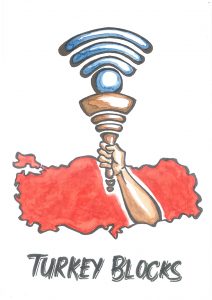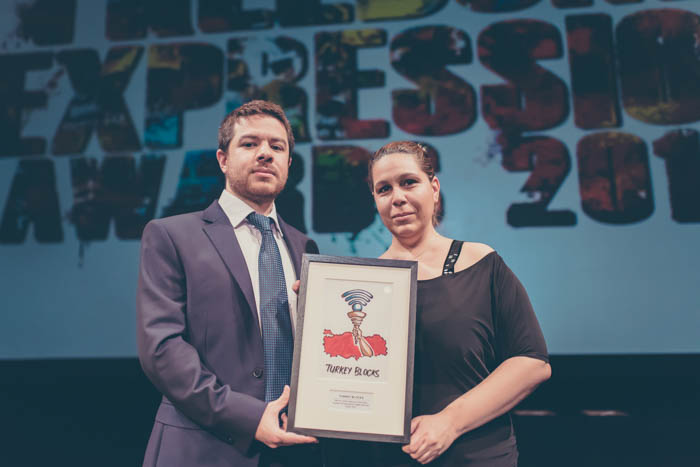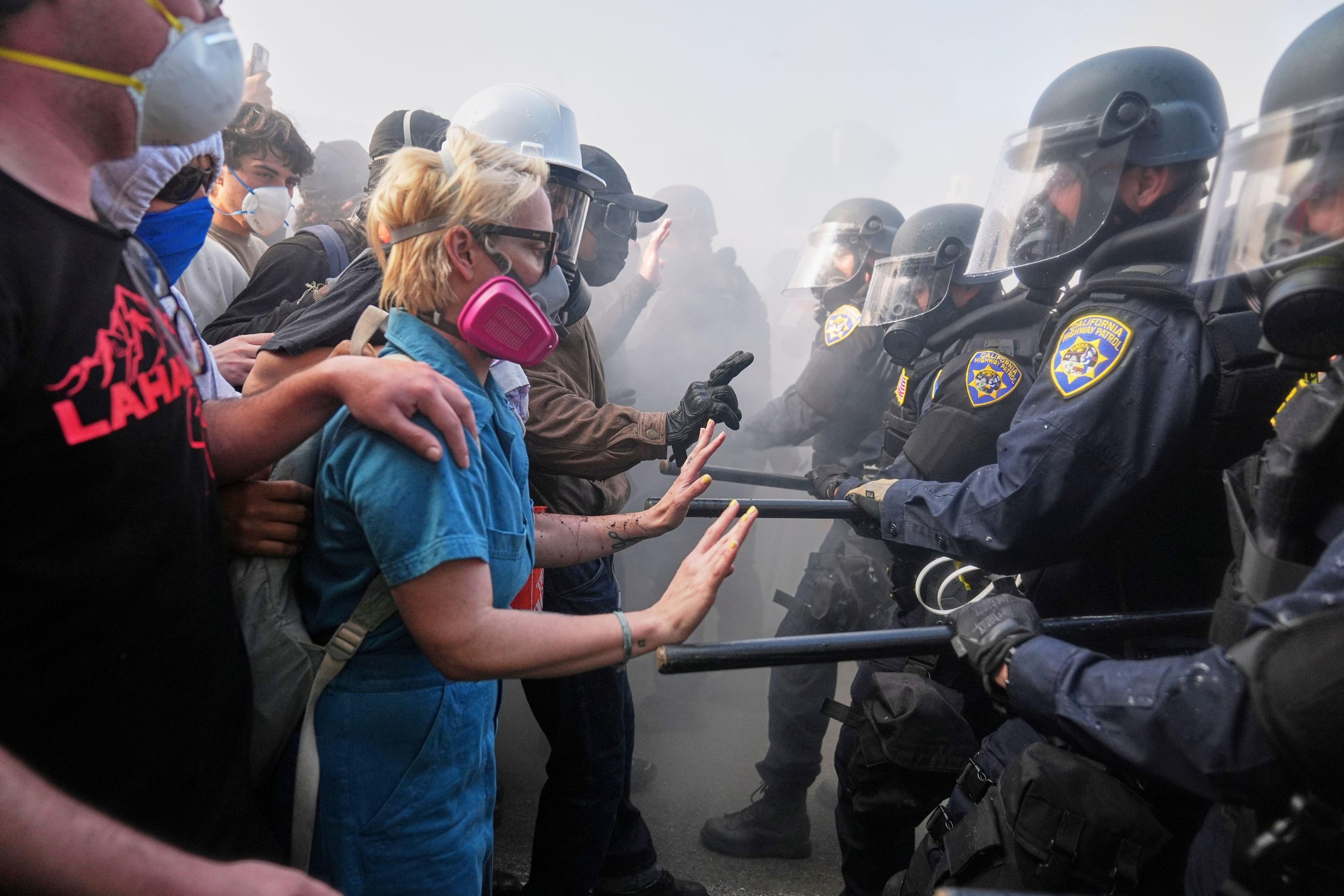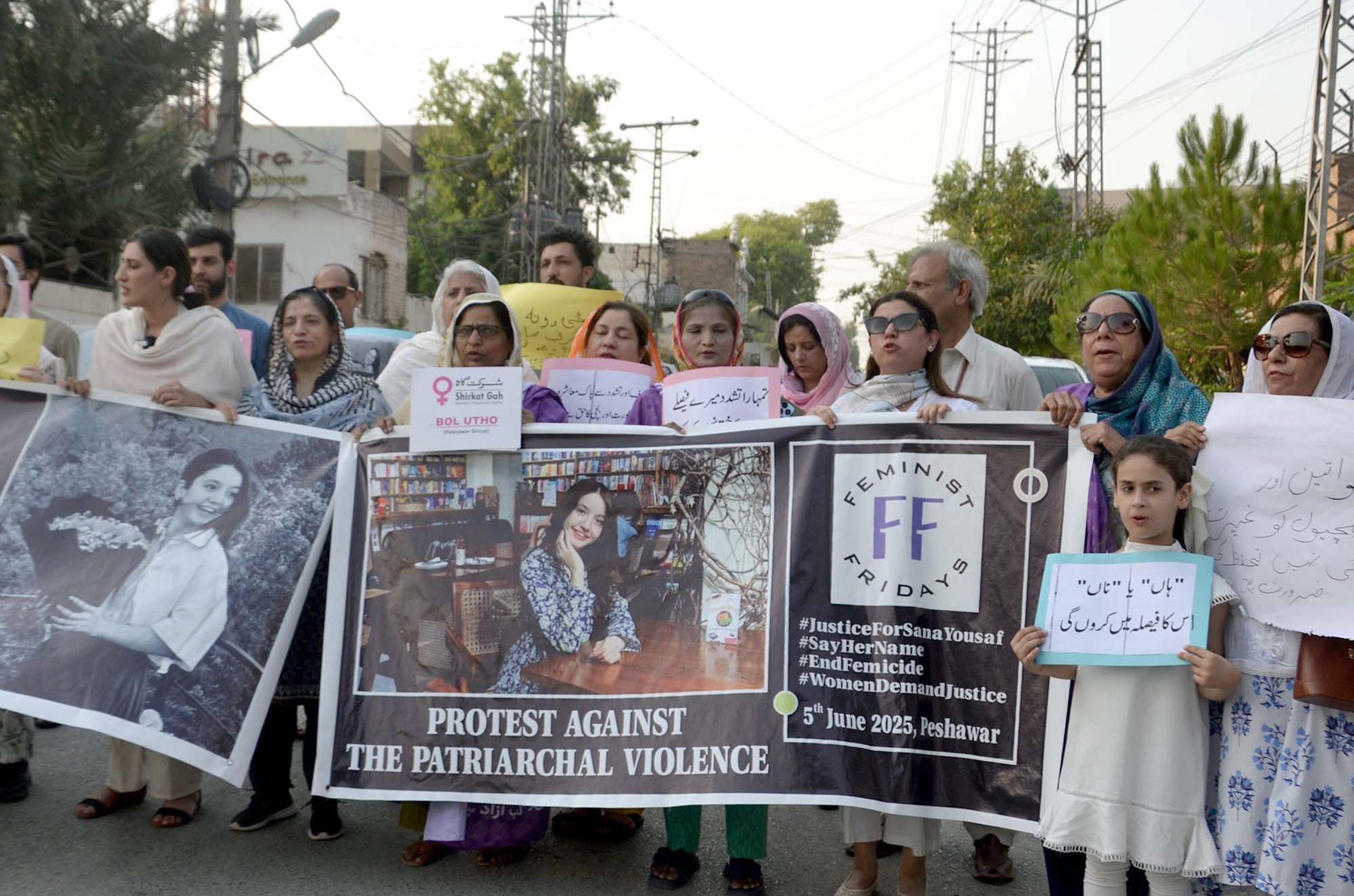[vc_row][vc_column][vc_column_text]
In a country marked by increasing authoritarianism, a strident crackdown on press and social media as well as numerous human rights violations, Turkish-British technologist Alp Toker brought together a small team to investigate internet restrictions. Using Raspberry Pi technology they built an open source tool able to reliably monitor and report both internet shut downs and power blackouts in real time. Using their tool, Turkey Blocks have since broken news of 14 mass-censorship incidents during several politically significant events in 2016. The tool has proved so successful that it has been implemented elsewhere globally.

2017 Freedom of Expression Digital Activism Award-winning Turkey Blocks was presented an illustration created by cartoonist Aseem Trivedi
Internet shutdowns – the wholesale censorship of millions of voices and silencing of entire populations – pose a grave threat to the media, democracy, most of all vulnerable communities and ordinary citizens. Since the invention of the world wide web we have come to rely on the internet for personal communication, news gathering, publishing and almost every aspect of our lives. That reliance has introduced a single point of failure which is now being exploited by authorities who seek to control narrative and restrict the flow of information on an unprecedented scale.
In 2015, I was in Ankara when so-called Islamic State launched a deadly terror attack, killing over a hundred people at a rally. In the hours that followed the authorities restricted access to social media and communication networks; victims were unable to contact their loved ones or reach out for help. Journalists were unable to contact eyewitnesses or ask critical questions so essential in a healthy democracy.
Our mission was born: Since then my organisation Turkey Blocks has developed new technology that can pinpoint and validate reports of shutdowns in real time. Through 2016 we uncovered evidence of over a dozen major blackouts during national emergencies, arrests of opposition party members and a devastating attempted military coup. We provided the data that enabled media, local press and international communities to report with confidence and push back to keep the internet on. We encouraged the government to become more transparent and limit use of their telecommunications kill-switch. Today our cause crosses political lines and resounds throughout Turkey’s polarised society.
Online censorship is increasingly used to mask more severe human rights violations – not just in Turkey, but from China, Vietnam, Pakistan, India, Kashmir, to Cameroon and Bahrain and all over the world. My team’s mission now extends beyond Turkey to cover several other countries as part of our NetBlocks observatory project. With new allies like Access Now and Index’s own Mapping Media Freedom project, standing alongside the global Open Source and open technology communities we send a unified message to those who seek to silence independent voices: as long as freedom of expression and digital rights are not safeguarded, our mission will continue and we will persist.

Alp Toker and Isik Mater of Digital Activism Award-winning Turkey Blocks at the 2017 Freedom of Expression Awards (Photo: Elina Kansikas for Index on Censorship)
[/vc_column_text][/vc_column][/vc_row][vc_row][vc_column width=”1/2″][vc_single_image image=”84882″ img_size=”full” alignment=”center”][vc_column_text]
Speech: Ildar Dadin: “Together, we can refuse to look away”
Profile: #IndexAwards2017: Ildar Dadin courageously defends the right to protest in Russia
For his one-man protests, Ildar Dadin was sent to prison in December 2015 where he was tortured, before his conviction was quashed in February 2017. Read the full profile.[/vc_column_text][/vc_column][vc_column width=”1/2″][vc_single_image image=”84888″ img_size=”full” alignment=”center”][vc_column_text]
Speech: Rebel Pepper: “I will continue working hard on creating new cartoons”
Profile: #IndexAwards 2017: Chinese cartoonist Rebel Pepper refuses to put down his pen
Despite the persecution he faces for his work, Rebel Pepper continues to satirise the Chinese state from a life in exile in Japan. Read the full profile
[/vc_column_text][/vc_column][/vc_row][vc_row][vc_column width=”1/2″][vc_single_image image=”84889″ img_size=”full” alignment=”center”][vc_column_text]
Speech: Alp Toker, Turkey Blocks: “Online censorship is increasingly used to mask more severe human rights violations”
Profile: #IndexAwards2017: Turkey Blocks strives to win back the internet
Established in 2015, Turkey Blocks is an independent digital research organisation that monitors internet access restrictions in Turkey. Read the full profile.
[/vc_column_text][/vc_column][vc_column width=”1/2″][vc_single_image image=”84887″ img_size=”full” alignment=”center”][vc_column_text]
Speech: Zaheena Rasheed, Maldives Independent: “This award feels like a lifeline”
Profile: #IndexAwards2017: Maldives Independent continues to hold government to account despite pressures
Maldives Independent, the Maldives’ premiere English publication and one of the few remaining independent media outlets, was formed in exile in Sri Lanka in 2004. Read the full profile.
[/vc_column_text][/vc_column][/vc_row][vc_row][vc_column][vc_column_text]Milyonlarca sesi toptan susturan internet kesintileri, medya ve demokrasinin etkili çalışmasını engelliyor ve en önemlisi, savunmasız toplulukların ve vatandaşların hayatını zorlaştırıyor. İcat edilmesinden bu yana, kişisel iletişim, haber alma, yayınlama gibi pek çok yönden internete bel bağlamış durumdayız. İnternetin yaşantımızda bu kadar büyük bir yer kaplaması, erişimin kısıtlanması durumunda büyük boşluk yaratıyor.
IŞİD’in Ekim 2015’te Ankara Garı yakınlarında düzenlenen miting sırasında gerçekleştirerek yüzlerce kişinin ölümüne sebep olduğu, Türkiye tarihinin en ölümcül terör saldırısı sırasında ben de Ankara’daydım. Saldırının hemen akabinde yetkililer sosyal medyaya ve iletişim ağlarına erişimi kısıtladılar; o sırada mitingde bulunanlar ailelerine ulaşıp “ben iyiyim” diyemediler, yaralı olanlar için yardım isteyemediler. Gazeteciler, her sağlıklı demokraside olması gereken bilgiye ulaşma özgürlüğünden mahrum bırakıldılar. Görgü tanıklarıyla iletişime geçip, olaylarla ilgili ayrıntıları öğrenemedikleri için konuyla ilgili haber yapmakta zorlandılar.
Görevimiz artık belliydi. O günden itibaren Turkey Blocks organizasyonu olarak, internet engellemelerini gerçek zamanlı olarak saptayabilen ve doğrulayabilen yeni bir teknoloji geliştirdik. 2016 yılı süresince, ulusal krizler, muhalefet partisi üyelerinin tutuklanması ve askeri darbe girişimi gibi olaylar sırasında ülke çapında ondan fazla kesintiye dair bulgular elde ettik. Elde ettiğimiz veriler, medya, yerel basın ve uluslararası organizasyonların internet kullanıcılarına doğru ve ayrıntılı bilgi vermelerini ve kullanıcıların internet kesintilerine karşı durabilmelerini sağladı. Hükümeti daha şeffaf olmaya ve internet kesintilerini en aza indirgemesini teşvik ettik. Girişimimiz bugün siyasi sınırları aşarak, ayrım gözetmeksizin tüm Türkiye’ye bilgi sağlıyor.
Dijital sansür, sadece Türkiye’de değil. Çin, Vietnam, Pakistan, Hindistan, Keşmir, Kamerun ve Bahreyn gibi dünyanın birçok ülkesinde meydana gelen ve gittikçe ciddileşen insan hakları ihlallerini gizlemek için giderek daha çok kullanılmakta. Ekibimizin yeni misyonu, NetBlocks gözlemleme projesi dahilinde, Türkiye dışındaki diğer ülkelere de ulaşmak. Access Now ve Index on Censorship’in Mapping Media Freedom Projesi gibi müttefiklerle birlikte küresel Açık Kaynak, Özgür Yazılım ve açık teknoloji topluluklarının yanında yer alarak, bağımsız sesleri susturmak isteyenlere ortak mesajımızı gönderiyoruz: Misyonumuz, ifade özgürlüğü ve dijital haklarımız korunmadığı sürece var olacak ve yolumuza devam edeceğiz.[/vc_column_text][/vc_column][/vc_row][vc_row][vc_column][vc_basic_grid post_type=”post” max_items=”12″ style=”load-more” items_per_page=”4″ element_width=”6″ grid_id=”vc_gid:1492791622630-bd3f02e6-28e4-6″ taxonomies=”8935″][/vc_column][/vc_row]





